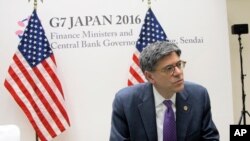Consumers around the world are holding onto their money, say the finance leaders of the Group of 7 meeting in Japan.
There are a number of reasons for consumer apprehension about spending their hard-earned money.
Some have limited purchasing power because their budgets are tightly stretched. Others may have little savings or are opting to save rather than spend.
Their reluctant spending habits are having a ripple effect around the world.
The G-7 finance leaders say consumers' fiscally conservative ways have led to a worldwide economic dilemma. Companies and factories are churning out consumer goods, but consumers are not buying.
"There is no demand and that is one of the biggest problems around the world," Japanese Finance Minister Taro Aso said.
Spur growth
U.S. Treasury Secretary Jack Lew has urged governments and businesses to use whatever "policy levers" are available to them to spur growth.
Most of the governments of the G-7 favor more pro-active government spending to help support flagging growth.
Economic powerhouse Germany, however, has maintained a more conservative stance on any financial reforms.
The officials have also warned against the dire consequences of "Brexit:" Britain leaving the European Union.
"Everyone here at the G-7 is clear ... it would be bad for the British economy if we left the European Union," Britain Finance Minister George Osborne said.
The finance leaders are meeting ahead of a summit to be held May 26-27 in Ise-Shima, central Japan.





